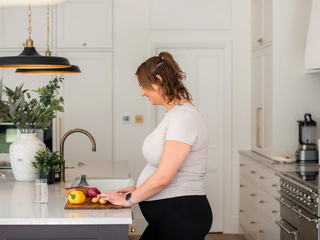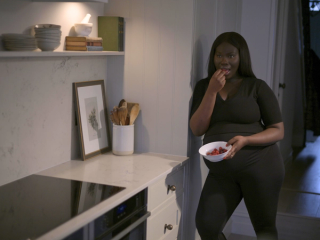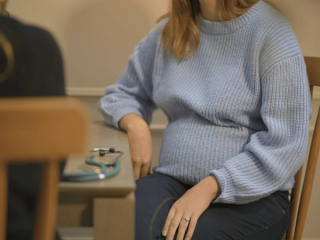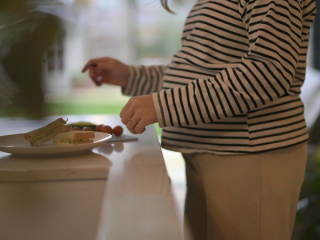
- Home
- Advice Hub
- Pregnancy
- Pregnancy Diet
- Foods To Avoid During Pregnancy
Foods to avoid during pregnancy
Read our expert guide on which foods should be avoided during pregnancy to keep your unborn baby safe.
From the moment you know you’re expecting, you’ll want to give your baby the best start in life. Eating a healthy, varied diet is one way to help. But not all foods are good for your developing little one. In fact, some can be harmful.
There are a number of foods to avoid during pregnancy. And some very good reasons why.
Certain foods may carry bacteria that can cause infections such as listeriosis or toxoplasmosis, which can be harmful to your unborn baby. While the risk of catching these may be low, you might want to cut them out of your pregnancy diet, just to be on the safe side.
Hygienic food preparation is another way to keep yourself safe. Simple things like washing fruit and veg before eating them, keeping utensils, work surfaces and your hands clean, and using separate knives and chopping boards for raw meats, all help.
What not to eat when pregnant: foods to be careful with – or avoid completely
Big on blue cheese, brie, and other mould-ripened cheeses? There’s a small chance that these and some other cheeses could contain listeria bacteria, which can lead to listeriosis. Listeriosis can make your unborn baby unwell, and in severe cases, even lead to miscarriage or stillbirth.
Soft cheeses, such as brie, camembert and chevre, and others with a white coating on the outside tend to have higher levels of moisture, which can make it easier for bacteria to grow.
However, if you’re a cheese lover, there’s a loophole to this rule – cooking these cheeses until steaming hot kills bacteria, which can reduce the risk of listeriosis.
Dairy products to avoid:
Cheese made from unpasteurised milk, such as soft ripened goats' cheese
Pasteurised or unpasteurised mould-ripened soft cheeses with a white coating on the outside, such as Brie, Camembert and chèvre (unless cooked until steaming hot)
Pasteurised or unpasteurised soft blue cheeses, such as Danish blue, Gorgonzola and Roquefort (unless cooked until steaming hot)
Any other unpasteurised dairy products, including unpasteurised cows' milk, goats' milk, sheep's milk or cream
If you’re wondering, can you eat feta when pregnant? The answer is yes. Feta is a pasteurised cheese.
Steer clear of raw and undercooked meat, as these carry the risk of toxoplasmosis, which can lead to miscarriage or if spread to your baby can cause serious complications.
Whatever meat you’re eating, make sure it’s thoroughly cooked for the full length of time at the temperature required, as stated on the packaging.
Additionally, when preparing and cooking meat or poultry, follow safe preparation methods, as you should with all foods, to try and prevent foodborne illnesses:
Always wash your hands before you start food prep, and after handling raw meat and eggs, as well as all the other usually recommended times – e.g. after going to the toilet, petting the dog, or blowing your nose.
If you’re preparing raw meat on your work surface, thoroughly clean and disinfect the area afterwards and make sure your work surfaces and utensils are clean.
Follow the hygiene guides for storing raw meat. For example, raw meat should be kept separate from ready-to-eat food, and ideally at the bottom of the fridge where it can’t contaminate anything. It’s also important to make sure your fridge and freezer are working properly and at the appropriate temperatures. Defrost meat thoroughly before cooking.
Don’t eat meat that is past its use by date.
Follow cooking guidelines and ensure meat is cooked through before eating. Don’t leave leftovers out on the side – put them in the fridge as soon as they have cooled to room temperature
Meats to avoid:
Love a little liver? Not while you’re pregnant. Liver contains high levels of vitamin A, which can be harmful to your unborn baby.
All types of pâté, including vegetarian pâté are off the cards, as they may contain listeria. Additionally, many meat pâtés contain liver, which should also be avoided due to the high Vitamin A content as mentioned.
Raw or undercooked meat.
Game, like goose, pheasant and partridge (these may contain lead shot).
Cured meats like Parma ham, salami, chorizo, pepperoni etc. are not cooked, and therefore should be avoided during pregnancy. Uncooked cured meats may have parasites in them that cause toxoplasmosis.
Raw or partially cooked hen eggs are fine to eat as long as the eggs used are hen eggs that are British Lion stamped on their shell, as they are unlikely to contain salmonella; so you can still enjoy a runny yolk in your poached egg!
If you’re using hen or other eggs that aren’t British Lion stamped (including quail, goose or duck eggs), then you need to ensure that both the white and yolk of the egg are well cooked to avoid the risk of salmonella. That means no runny yolk.
Salmonella is a bacterial disease which can give you food poisoning, causing diarrhoea, fever and stomach cramp. Although unlikely to harm your unborn baby, in severe cases, salmonella can cause dehydration.
Types of eggs to avoid:
Raw or partially cooked eggs (unless they’re British Lion)
Duck, goose or quail eggs – unless they’re hard boiled (solid white and yolk)
Craving tuna? Watch how much you eat, as recommendations are for no more than two tuna steaks, or four medium-size tins per week. Tuna is high in mercury, which can harm your unborn baby.
Other fish which contain high levels of mercury are recommended to avoid altogether; these include Shark, Marlin and Swordfish. You also need to set a limit on the total amount of oily fish you eat every week; oily fish include salmon, mackerel, trout and herring (tuna isn’t classed as an oily fish). This is because they may contain pollutants such as dioxins and polychlorinated biphenyls in them, which if consumed in high quantities, can be harmful to your unborn baby.
Can you eat prawns in pregnancy? Yes, as long as they are cooked. Raw shellfish, like oysters, contain harmful bacteria and toxins that can make you unwell or give you food poisoning, so should be avoided. However, cooked shellfish, including cold pre-cooked prawns are safe to eat during pregnancy.
And finally, you should also avoid ready-to-eat cold-smoked or cured fish because it could be contaminated with listeria bacteria. Sadly, that includes smoked salmon. These bacteria can cause an infection called listeriosis, which can make your newborn baby unwell, and in severe cases, even lead to miscarriage or stillbirth. However, cooking smoked or cured fish until it's steaming hot will kill any bacteria that may be present.
Be careful:
Oily fish – limit to two portions a week.
Tuna – limit fresh tuna steaks to two portions a week (1 portion = about 140g cooked or 170g raw), or four medium size cans a week (1 tin = about 140g when drained).
Cured fish or cold smoked fish, such as smoked salmon and sushi, unless it has been thoroughly cooked
Types of fish to avoid:
Swordfish, marlin, shark
Raw shellfish.
Cold-smoked or cured fish, unless it has been cooked until steaming hot
Vitamin A
Avoid supplements containing vitamin A, such as fish liver oil and multivitamins with vitamin A in (specialist pregnancy supplements do not contain vitamin A). Although Vitamin A is important for good health and for the healthy development of your baby, large amounts can harm your unborn baby. You’ll get enough vitamin A from your food without taking supplements.
Alcohol - the NHS advises there is no known safe limit of alcohol during pregnancy and so the safest approach is to not drink alcohol while you’re pregnant. Alcohol can cross the placenta and affect foetal development and is also linked to miscarriage, stillbirth, premature birth and low birth weight.
Caffeine – Caffeine intake should be limited to no more than 200mg per day, and unfortunately, chocolate, as well as tea and coffee, contains caffeine.
Regularly consuming over 200mg caffeine per day can increase your risk of pregnancy complications, such as low birthweight, and even miscarriage
Levels found in some typically caffeinated chocolates and drinks are:
Around 25mg in 50g of plain dark chocolate
Around 10mg in 50g of plain milk chocolate
100mg in a mug of instant coffee
140mg in a mug of filter coffee
75mg in a mug of tea (green tea can have the same amount of caffeine as regular tea)
40mg in a can of cola
80mg in a 250ml can of energy drink
It might seem counter-intuitive, but be mindful that decaf coffee does still contain small amounts of caffeine. Not as much as instant coffee, of course (there is around 2mg of caffeine in decaf vs 100mg in a mug of instant coffee), but it is still worth including decaf in your daily caffeine intake count.
If you’re thinking of switching coffee for herbal tea, bear in mind that the caffeine content of herbal teas can vary quite widely between brands and types. For example, green tea contains caffeine and matcha green tea can be as high in caffeine as black tea. Caffeine content will be listed on the pack, so check the ingredients before you make yourself a cup.
It’s also worth noting that some herbal teas are not recommended for pregnant women, such as St John’s Wort, parsley, sage and valerian. If in doubt, talk to your healthcare professional and as a general rule, limit yourself to 1-2 cups of herbal tea per day.
Good food groups for pregnancy
During pregnancy, it’s more important than ever to eat a healthy, balanced diet. Your diet will not only influence your own health, but can also affect the short- and long-term health of your baby.
Your diet should follow the advice of the Government’s Eatwell guide, to:
- Eat at least 5 portions of fruit and vegetables per day
- Base meals on starchy foods (choosing wholegrain varieties where possible)
- Eat some beans, pulses, fish, eggs, meat and other protein foods
- Have some dairy or dairy alternatives (opting for lower fat and lower sugar options where possible)
- Choose unsaturated oils and spreads, and eat in small amounts
- Eat foods high in fat, salt and sugar less often and in small amounts
- Drink plenty of fluids
There’s no need to balance every meal you eat, as long as you aim for balance throughout your day and across the week.
With so much information out there, it can feel overwhelming to try to remember what you can and can’t eat during pregnancy – especially in those early weeks when your hormones are playing havoc with your taste buds and your digestive system! Try not to worry. Make sure your partner is equally well informed, so that it’s not all on you to plan healthy, pregnancy-safe meals. And remember you can always reach out to your healthcare professional for more information and advice.
Join our BabyClub for lots of great tips, from coping with morning sickness, to eating well, and everything you need to take care of yourself during your pregnancy.
FAQs about foods to avoid during pregnancy
Yes, pregnant women can eat prawns so long as they are cooked. Cooked shellfish, including cold pre-cooked prawns, are safe to eat during pregnancy.
Yes, you can eat feta cheese when pregnant, as long as it has been made from pasteurized milk. The pasteurization process will kill any harmful bacteria.
Yes, you can eat smoked fish such as smoked salmon when pregnant as long as it has been cooked thoroughly.
Yes, you can eat peanuts during pregnancy – unless you have a nut allergy or have been advised otherwise by a healthcare professional. You do not need to avoid eating peanuts when you're pregnant.
Many women eat or drink ‘forbidden’ things before they realise they are pregnant, or before they know what to avoid. Try not to worry. The risks are low. However, if you feel unwell, or you’re concerned, contact your midwife or other healthcare professional for advice.






